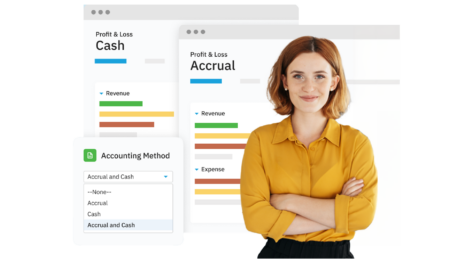Guide
5 signs it's time to move on from QuickBooks
A revealing list of the top reasons businesses make the switch

Guide
A revealing list of the top reasons businesses make the switch

But many business leaders and finance professionals don't realize that by clinging to QuickBooks year after year, they're trading precious time for endless manual data entry.
That means you and your team work extended hours, sacrifice evenings and weekends, and ultimately do less with more people—all in an attempt to achieve what an automated, CRM-connected accounting solution could effortlessly provide.
So, what's the real cost of sticking with the status quo? From a business perspective, it’s missed opportunities for growth, lack of visibility into profitability and performance, and more manual work for you (and your team). Even more important, on a personal level, it means more late nights, missed family moments, and a lower overall quality of life.
While QuickBooks may have served your business well in the early stages, as your company grows and becomes more complex, its limitations become increasingly apparent.
Here are five clear signs it's time to consider moving on from QuickBooks and embrace a more robust, CRM-connected accounting platform like Accounting Seed.
With Quickbooks, your CRM data doesn’t talk to your accounting data. They remain in two separate houses. To connect the two, you have to add third-party integrations (at an additional cost). However, the results are often far from satisfactory. Despite the third-party connectors, you're still not using the same records, which leads to duplicate data entry and bad data hygiene. This leaves room for errors and discrepancies, causing frustration and wasted time. Not to mention, these integrations are often short-lived at best; as your business inevitably changes, they tend to break and require rebuilding.
Fortunately, there's a solution that eliminates these challenges—Accounting Seed. Built natively on the Salesforce platform, Accounting Seed is a cloud-based accounting system that connects your front and back office without the need for development support. By sharing the same database as Salesforce CRM, Accounting Seed ensures you have a single source of truth across your business. Due to Accounting Seed’s flexibility, what you build on the platform today can continue to evolve and grow with your business over time. With other solutions, you likely need to Bandaid together your accounting system in a few years when your business has outgrown it.
As your business grows in complexity and you gain new customers, you start to question the reliability of your financial data when using QuickBooks. With customer information scattered across multiple systems, such as your accounting software, CRM, and marketing automation solutions, it becomes increasingly difficult to determine which source holds the most up-to-date and accurate information. QuickBooks relies on integrations to pull data from various sources, but these integrations are not always in sync (and rarely in real-time). The lack of a single source of truth can lead to confusion and uncertainty when it comes to running reports and analyzing metrics.
With Accounting Seed—you can house your sales, operations, and financial data in the same place because it's built natively on the salesforce platform. So you can be confident that you're always working with the most up-to-date and reliable information. That way, you can seamlessly collaborate between departments and make crucial business decisions in a timely manner.
As your business grows, you may face barriers to expanding and establishing operations in multiple countries—particularly when it comes to managing your finances.
Today, QuickBooks is not a global solution. If your company has operations in the United States and the United Kingdom, for example, you may find yourself in need of different accounting software for each location. This fragmented approach results in higher costs, disconnected data, and the need for complex integrations to bring everything together.
Accounting Seed is a software solution that supports global businesses in a variety of different industries. With a track record of serving many international customers, including companies based in Canada, Europe, Asia, and Australia, Accounting Seed is well-equipped to support global expansion. The software offers a range of multi-company and multi-currency features.
The lack of advanced data tagging and multidimensional data slicing capabilities in QuickBooks can lead to a heavy reliance on manual spreadsheet work. Without the ability to easily categorize your financial data using flexible or configurable tags or "classes," you're forced to pull that data manually and manipulate it in Excel. This eats into your productivity and means that by the time you've sorted and formatted the data into a presentable state for leadership, it's already outdated. In fact, studies show that 71% of finance teams dedicate a full day each week to operational reporting, and 95% generate either all or mostly static reports.
Making decisions based on stale information can lead to missed opportunities, inaccurate forecasting, and a lack of agility in responding to changing market conditions.
Accounting Seed offers the ability to assign multidimensional tags to your financial data, so you can easily categorize expenses and revenues in ways that make sense for your business. For example, you can split "marketing department trade shows Europe" into separate lines for marketing, trade shows, and Europe, and then automatically run financial reports against these dimensions. Out-of-the-box dashboards for key metrics like billing opportunities, billings by customer, and cash disbursements give you instant visibility into your company's performance. In contrast, QuickBooks limits you to a certain number of classes and requires creative integrations to report on different dimensions of your business.
With QuickBooks, you may find it challenging to analyze revenue trends; compare performance across products, regions, or customer segments; or uncover actionable insights. The limited reporting capabilities hinder your ability to gain a comprehensive view of your business, making it difficult to identify areas for improvement or spot growth opportunities. In order for you to get the kind of reporting you want to see in QuickBooks, you would have to buy and integrate more apps, meaning more money spent and more tech to manage. This often still requires exporting data into spreadsheets to manipulate and analyze the data, leading to further inefficiencies and potential errors.
In contrast, Accounting Seed offers powerful built-in business intelligence capabilities. You can easily answer questions like, "Where did I earn revenue by geography for the products that I sell?" You can view and analyze revenue trends by week, month, or year. Or you can identify top-performing products, regions, or customer segments, and compare performance across different time periods or dimensions. Accounting Seed's advanced Financial Analytics tool, an add-on to the core product, provides interactive dashboards and charts that allow you to visualize your data in meaningful ways. These visual representations make it easier to spot patterns, anomalies, and opportunities that might otherwise go unnoticed in traditional reports.

Your CRM and financial data are never truly connected on QuickBooks. This disconnect means you aren't getting your financial data fast enough to make the right decisions, and the data is often unreliable because the sync between the two systems often breaks. Now, you don't have the ability to pull and compare financial data to meet your company's goals.
As a result, the workload intensifies. Today, 56% of accountants are still using legacy systems to run their accounting operations, and on average, over a third (39%) of tasks are currently automated. This leaves more than half of accounting and finance processes being fulfilled manually, with a high dependence on traditional Excel spreadsheets.
The good news is that thousands of users have successfully made the change from QuickBooks to Accounting Seed. These adopters are saving hours, days, and even weeks each month closing their books. Just take a look at the success stories of companies like JumpRope, LionHeart, and LB Technologies.
Making a change may feel daunting and will require some upfront change management, but the business impact of waiting will inhibit your business. Once teams understand the structure of Salesforce and Accounting Seed, they will appreciate the new efficiencies and it will become routine.
Take it from JeaNae Remala, Controller at LionHeart, who moved her company onto Accounting Seed after using QuickBooks:
Many people here used QuickBooks for years. But, once they understood the structure of how Salesforce and Accounting Seed work — headers, line details, reports, etc. — it became routine. We have access to a lot more data, things you would not have the opportunity to see in QuickBooks.
Plus, with plenty of learning modules and dedicated staff ready to guide you, you'll have the support you need to make the transition as smooth as possible.
At Accounting Seed, we have expertise in moving businesses off of QuickBooks and will assist you every step of the way! Book a demo with Accounting Seed today.
"*" indicates required fields